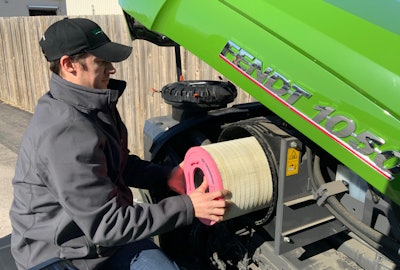
Filter maintenance is critical to your equipment’s health. That’s not an idea that’s new to any producer, yet regular maintenance and inspection can sometimes get lost in the shuffle of a busy harvest or planting season. But equipment performance, system longevity and even resale value can all be directly impacted by proper filter maintenance.
“It’s important to remember that as systems wear, filters remove debris from the fluid to ensure that damage does not occur,” says Brian Gould, field service manager, and the team at New Holland North America. “If the filter is not maintained, a buildup of debris in the filter will result in reduced performance as well as increased heat throughout the system. And if the restrictions become too great, many filters have a bypass built in to prevent starvation and catastrophic damage to the pump. The filter opens, allowing contaminants to flow through the pump and the entire system and contaminating multiple components.”
This speaks to the importance of consistent filter maintenance. Customers are advised to follow the stated service interval on their quality filter to prevent contaminants from entering the fuel system, engine and cab, according to John Deere. As a filter extends past the service interval, components will be unable to perform at optimal levels.
The method behind maintenance schedules
Filter maintenance schedules, as well as specific filter recommendations, are specific to equipment and operating conditions for a reason: manufactures spend a considerable amount of time and research to determine proper maintenance intervals that maintain adequate protection while keeping operating costs as low as possible.
Maintenance schedules are readily available in service manuals and can vary depending on operating conditions and type of filter (fuel, oil, air and hydraulic). Keeping a log book with a tractor is highly recommended, but so is a simple task of writing the date of installation and the engine hours on the filter itself. That way, if a log book gets lost, or if someone fails to record when a filter is changed, you have an immediate backup.
And the right filter matters.
“You want to make sure that the filter you are putting on the tractor is compatible with the properties of the fluids in the tractor,” says Brett Gutknecht, high horsepower product specialist, Case IH. “The filter also needs to match recommended cleanliness standards that the tractor needs to keep components working properly.”
Sensors in newer equipment can identify fluid restrictions during operation, which can alert the operator. “If that occurs you will need to check and possibly replace a filter,” Gutknecht says.
Operators also need to consider if tractor maintenance or repairs may have introduced contaminants into the fluid systems.
“This can happen purely by accident,” Gutknecht says. “But if it does occur, or you think it might have occurred, I would recommend letting the tractor run to make sure that the filter is going to catch that debris. And depending on the situation, you may want to replace the affected filters.”
There are also specific operating conditions that must be considered. If you are operating in extreme conditions, such as moving from extreme cold to storage, you can potentially create condensation in the system, which could result in the need to change the filters at shorter intervals or even seasonally.
Not all filters are created equal. Each system on a tractor has specific requirements regarding filtration. Equipment manufacturers work with suppliers to determine the needed filtration and component requirements. An off-the-shelf filter may fit, but it may not have the beta rating needed for the components to last. The filter may cost less, but you risk wear and tear on components and that may cost you more in the long run.
An inferior fuel filter will do a poor job of separating water from the fuel (caused by condensation). Water is the worst enemy for an engine — it eventually causes an engine to break down. Deposits in the fuel system also can lead to injector failure, which can be a time-consuming repair.








